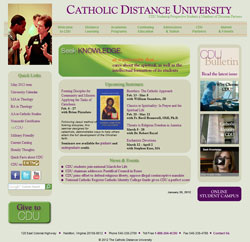Archdiocesan formation for lay ministry goes online

This is the homepage of the website for Catholic Distance University (www.cdu.edu) that, along with the University of Notre Dame, is partnering with the Archdiocese of Indianapolis to offer online courses for the theological formation of lay ministers in central and southern Indiana.
By Sean Gallagher
Offering a solid theological formation for lay ministers who don’t want to or couldn’t pursue a degree has been a challenge for the Archdiocese of Indianapolis for years, according to Edward Isakson, archdiocesan director of lay ministry.
“We have 39 counties,” he said, “and even when we’d offer classes in two locations, we’d still hear from people who said that they just couldn’t get to them.”
Isakson, who also serves as archdiocesan human resources director, said the problems were compounded by the busy schedules or transportation challenges of people taking the courses.
To overcome these obstacles, the archdiocese is now offering theological formation for lay ministers in online courses through Catholic Distance University—www.cdu.edu—and the University of Notre Dame—www.step.nd.edu.
“The biggest barriers that existed before were accessibility and scheduling,” Isakson said. “ … They don’t matter anymore. You can take [the classes] whenever you want to.”
And the online courses are also less expensive. The archdiocese will reimburse the full cost of courses taken through Catholic Distance University and half of the cost of courses taken through Notre Dame.
“We can use the same budget and have over five times as many students taking classes,” Isakson said. “That’s the efficiency of online learning. It is so much less expensive. We’ve made the cost lower for people. There are no commuting fees. There are no fees for textbooks because the readings are online.”
The variety of courses open to lay ministers in the archdiocese has been expanded now, Isakson said.
In the previous formation program, there was no course on Catholic social teaching. Now, directors of Catholic Charities agencies across central and southern Indiana have taken such a course together online.
Isakson also said that courses are offered to help bring students up to speed who may not have studied their faith in a formal way for decades. One course offered by Catholic Distance University is on the Catechism of the Catholic Church.
“It’s a great refresher for many people,” he said. “For others, it may be rather new, especially folks who maybe didn’t receive a lot of catechesis as they were growing up.”
Isakson acknowledges that a drawback to online learning has been the lack of face-to-face interactions available in a traditional classroom setting. But he is seeking to overcome that by encouraging students taking the same classes who live close to each other to meet to discuss what they are studying.
“I think there are opportunities for people to supplement the theological formation of the classes by getting together in different ways,” he said.
The archdiocese is also supporting the spiritual formation of lay ministers by offering a $50 credit per year toward a retreat or day of reflection for people involved in the program.
Cathy Funkhouser, a member of St. Mary Parish in Richmond, has taken online courses in the lay ministry formation program to help with her involvement in various liturgical, catechetical and youth ministries in the three parishes that make up the Richmond Catholic Community.
The first course that she signed up for was on the sacraments, and was offered through Notre Dame.
“I have to admit that I was very nervous about taking an online class,” Funkhouser said. “I’m not all that computer savvy. But, to my surprise, the class was very easy to follow.”
More recently, she has taken a course through Notre Dame titled “The Christian Conscience and Ethical Dilemmas.”
“In both classes, I have enjoyed the reading and the communication with the class,” Funkhouser said. “I like how you can review what each student posts, and go back and read the [online] chat sessions.”
Isakson said that a series of courses offered through Catholic Distance University or Notre Dame have been determined as required for participants to earn a lay ministry certificate from the archdiocese. He said the required courses can vary based on the particular ministry a person is involved in.
Taking the classes online can also speed up the process to earn a certificate. Isakson said that if a person takes courses at an average pace now, a certificate can be earned in two to three years, about half the time required in the previous formation program.
(For more information on the archdiocese’s lay ministry formation program, log on to www.archindy.org/layministry.) †
